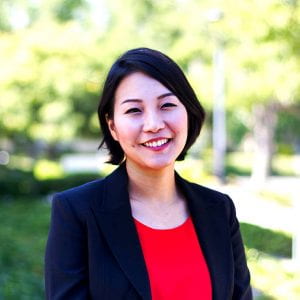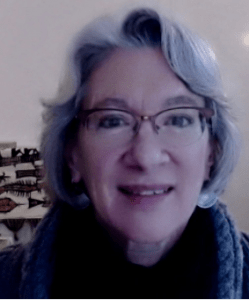June Lee is an Assistant Professor in Entrepreneurship, Innovation, Strategy, and International Business at University of San Francisco’s School of Management, and recent recipient of the 2020 Emerging Scholar Award from the Women in the Academy of International Business. This award recognizes one female AIB junior scholar for her potential and high-quality research in international business and gender. Our conversation discusses her research interests and how she became a professor at USF.

Briefly describe your research and recent work. How did you first become interested in this topic?
Before I began my career in academia, I was working in financial services. During the global financial crisis in 2008, I noticed that entrepreneurship was withstanding the weight of the crisis; in fact, entrepreneurship was booming. So I became interested in the discipline academically, and decided to pursue graduate degrees at Stanford University where I studied entrepreneurship and innovation.
How have the themes or focuses of your research changed over time? Are the discourses changing in international entrepreneurship and gender?
In recent years, I became more interested in the international aspect of entrepreneurship. Everything is becoming global these days, and unsurprisingly, entrepreneurship is at the forefront of this phenomenon. This leads to interesting topics that we can study and observe. For instance, immigrant entrepreneurs that I interviewed were utilizing cross-border resources and networks, and their outcome and performance would vary greatly because of the institutional contexts that they were faced with. I also became interested in the journey undertaken by female immigrant entrepreneurs—how and why they were choosing to become entrepreneurs, and how their multi-faceted identity shaped the type of entrepreneurship activities that they were engaged in.
What research or work are you most proud of?
I am most proud of my recent publication on female transnational entrepreneurs. In this study, my co-author and I developed a qualitative case study of Korean American female entrepreneurship in the San Francisco Bay Area and explored the intersectionality dynamic of ethnicity and gender. My study establishes a specific ‘gendered’ trajectory of female transnational entrepreneurs whose entrepreneurial motives and performances are influenced and shaped by a number of different individual and structural factors (e.g., gender, family role, immigrant status, ethnic identity, and transnational networks and resources).
Lee, J. Y., & Lee, J. Y. (2020). Female Transnational Entrepreneurs (FTEs): A Case Study of Korean American Female Entrepreneurs in Silicon Valley. Journal of Entrepreneurship and Innovation in Emerging Economies, 6(1), 67-83.
When you earned your PhD from Stanford University, were you focused on becoming an academic or did you consider another career?
My focus was to find an opportunity with which I could apply my knowledge, skills, and interests in the areas of entrepreneurship. In particular, an academic position that would allow me to engage in entrepreneurship research and education was compelling to me.
What brought you to USF?
I discovered this USF faculty position through a professional association to which I belong. I did like the proximity to San Francisco Bay Area, which is considered as the hub of entrepreneurship and innovation. In addition, it would allow me to leverage my existing network of entrepreneurs, investors, corporates, and other professionals in this area. Finally, I liked the balance of both teaching and research at USF and how the two could be aligned to inform each other.
What does the Emerging Scholar Award mean to you?
It was definitely a humbling experience to receive the 2020 Emerging Scholar Award from the Women in Academy of International Business. It motivates me to keep learning from more experienced scholars and senior researchers, and to make greater contributions to the field.
What are you looking at next?
I am working on numerous exciting research projects in the field of international and gender entrepreneurship, with faculty members at both USF and other institutions. For example, one study examines how female immigrant entrepreneurs utilize social media platforms in their entrepreneurship journey; another project assesses the impact of COVID-19 on the Silicon Valley entrepreneurship ecosystem.
